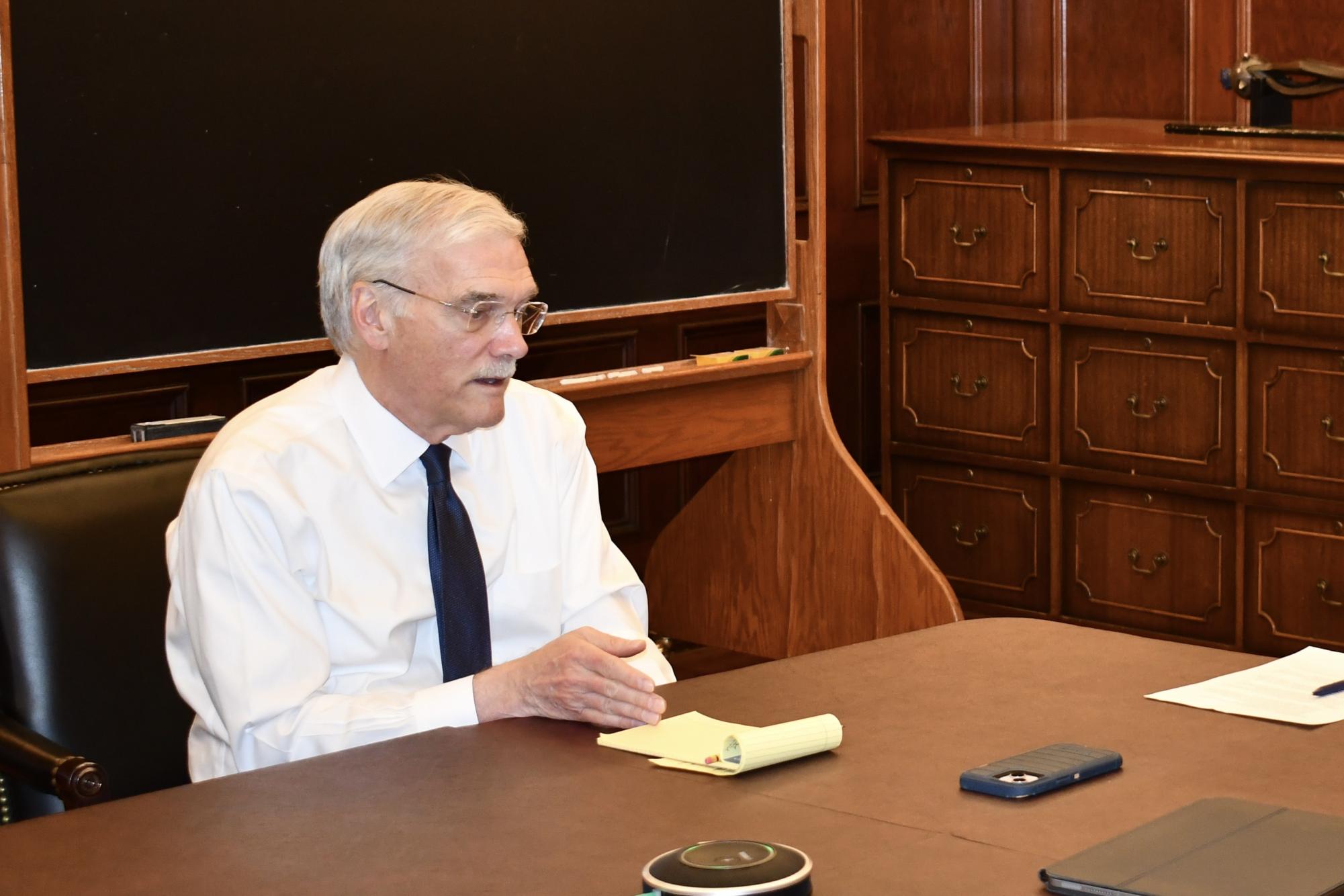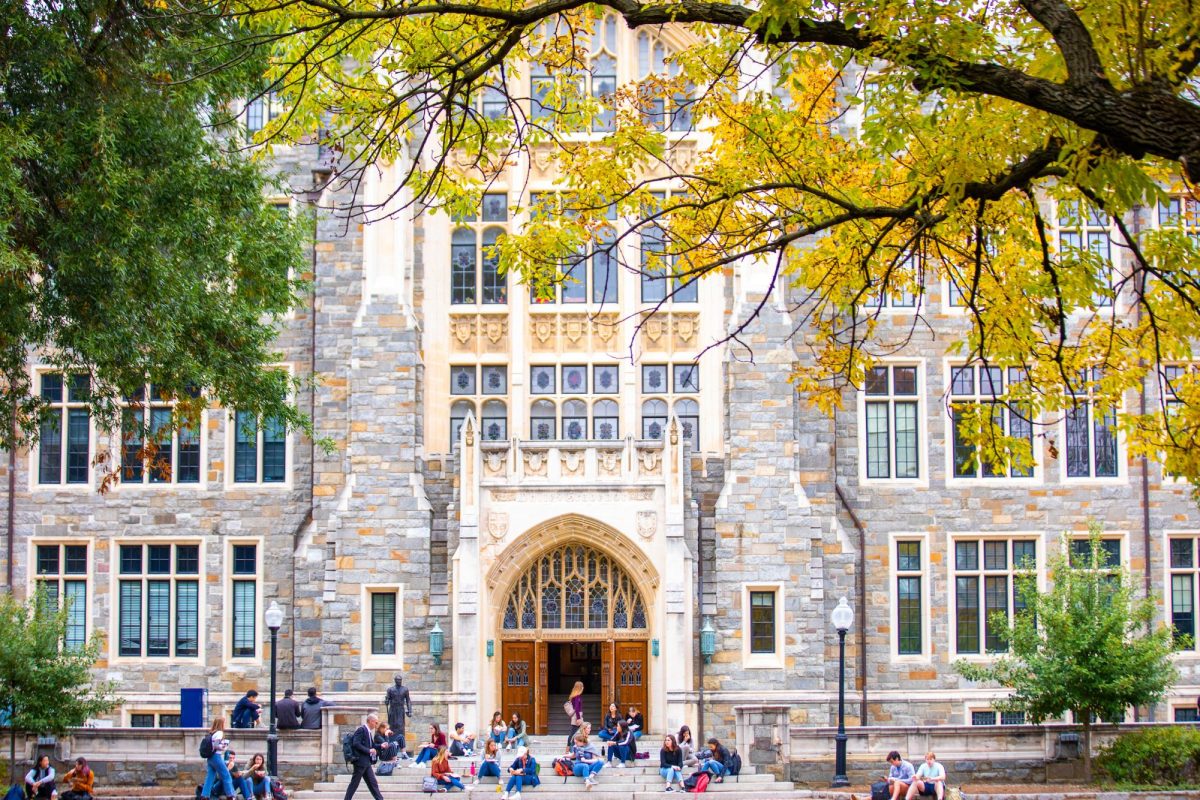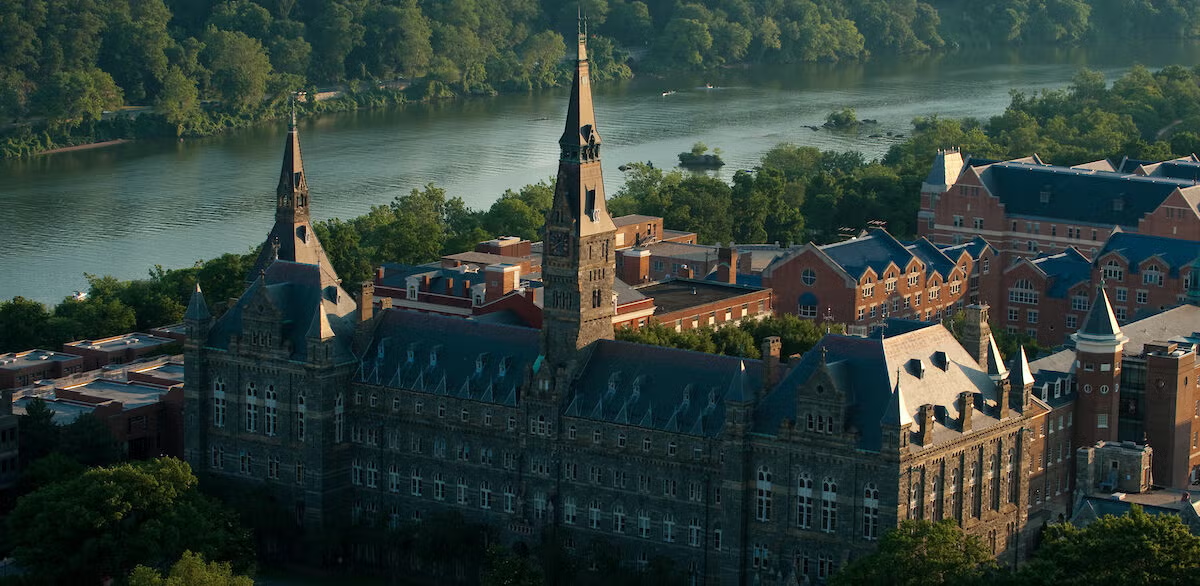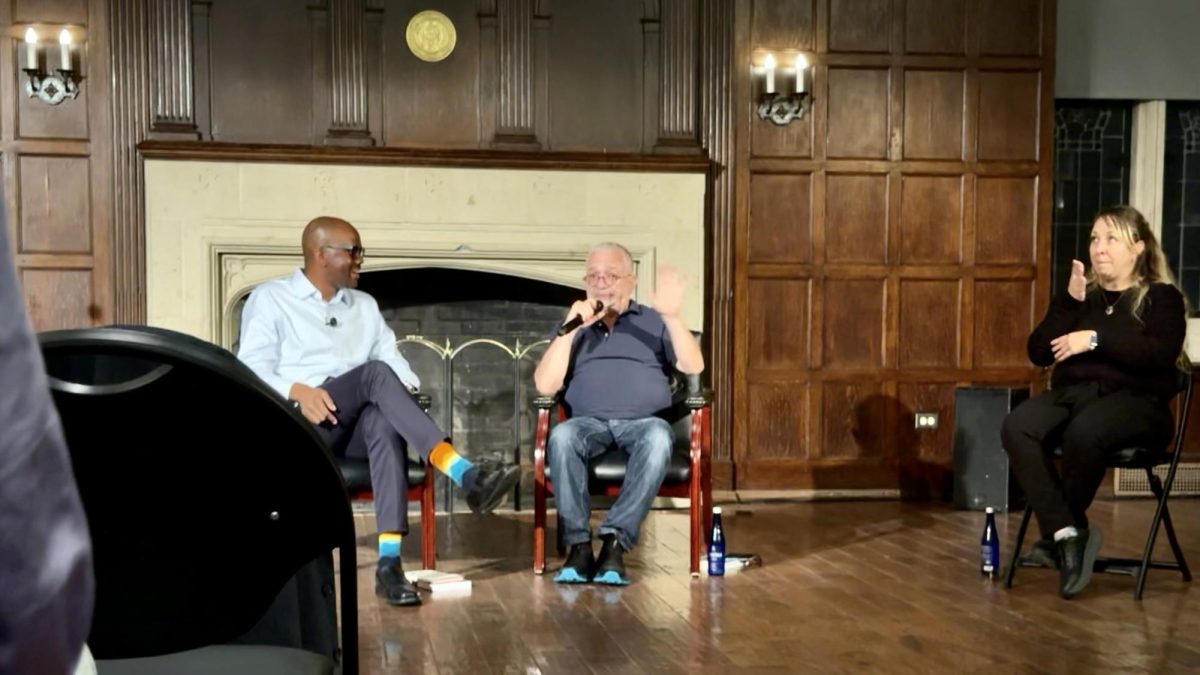Georgetown University Interim President Robert M. Groves will testify before the U.S. Congress July 9 about antisemitism on college campuses.
In addition to Groves, Félix V. Matos Rodríguez — the chancellor of The City University of New York — and Rich Lyons — the chancellor of the University of California, Berkeley — will testify as witnesses before the Committee on Education and Workforce. This House of Representatives committee, which oversees education at all levels, will aim to investigate the presence of antisemitism on campus.
Rep. Tim Walberg (R-Mich.), the chairman of the 45-person committee, said this hearing will investigate the causes of antisemitism on campuses, not just its effects.
“We continue to see antisemitic hatred festering at schools across the country,” Walberg said in a press release. “While much of the discussion has focused on the devastating effects of antisemitism, this hearing will focus on the underlying factors instigating antisemitic upheaval and hatred on campus.”
“Until these factors — such as foreign funding and antisemitic student and faculty groups — are addressed, antisemitism will persist on college campuses. Our committee is building on its promise to protect Jewish students and faculty while many university leaders refuse to hold agitators of this bigotry, hatred, and discrimination accountable,” Walberg added.
A university spokesperson said Groves will discuss Georgetown’s programming to prevent antisemitism at the hearing.
“Interim President Groves looks forward to testifying before the Committee and describing Georgetown’s efforts to combat antisemitism,” the spokesperson wrote to The Hoya. “As a Catholic and Jesuit University, Georgetown condemns antisemitism and all forms of hatred and is committed to ensuring our university is a safe and welcoming space for every member of our community.”
Groves will not be the first U.S. university president to testify before Congress about antisemitism. Since the outbreak of the Israel-Hamas war, several university presidents have testified before various Committee on Education and Workforce hearings, with some hearings leading to presidents’ resignations.
These hearings followed surges in campus protests, including sit-ins in 2023 and encampments in 2024, which some lawmakers have alleged were antisemitic. Primarily republican representatives called on the university leadership to testify about these events on four occasions, saying their goal was to understand antisemitism on college campuses.
December 2023 Hearing
The first hearing featuring university presidents to discuss the presence of antisemitism on campus, held Dec. 5, 2023, included Claudine Gay, then-president of Harvard University; Liz Magill, then-president of the University of Pennsylvania (UPenn); and Sally Kornbluth, president of the Massachusetts Institute of Technology (MIT).
Then-Chairwoman Virginia Foxx (R-N.C.) hosted the hearing, titled “Holding Campus Leaders Accountable and Confronting Antisemitism,” to investigate the initial administrative response to campus protests and events.
In November 2023, Harvard students supporting Palestine organized a 24-hour sit-in, pressuring the university to call for a ceasefire. MIT and UPenn also held protests in November that garnered national attention.
During the hearing, Rep. Elise Stefanik (R-N.Y.) asked each president whether calling on the genocide of Jewish people would constitute a code of conduct violation for their respective schools, to which each president similarly responded that it would be context-dependent.
The hearing prompted bipartisan criticism of their responses, including calls for the resignation of all three university presidents. The committee also launched a formal investigation into Harvard, UPenn and MIT, with Foxx citing her concerns over the university’s leadership and ability to protect Jewish students.
Four days after the hearing, Magill resigned amid the political criticism as graduates and donors raised questions about Magill’s leadership and threatened to withdraw donations. Though initially intending to remain Harvard’s president, Gay resigned Jan. 2, 2024, following backlash from the hearing and allegations of plagiarism. Kornbluth drew less political pressure and remains president of MIT.
The committee’s investigation continued after the hearing and resignations, requesting documents from the universities and hosting an additional hearing for student testimony.
April 2024 Hearing
Then-president of Columbia University Minouche Shafik testified for the committee regarding Columbia’s response to antisemitism on campus April 17, 2024. Reminiscent of the Dec. 5, 2023, hearing, the committee accused Columbia of failing to protect Jewish students.
During the hearing, Shafik answered a similar line of questioning from committee representatives, to which she responded that calling for the genocide of Jewish people would constitute a code of conduct violation at Columbia.
On the same day as the hearing, student and community member protestors launched the first encampment in support of Palestine on Columbia’s South Lawn, calling on the university to divest from companies with ties to the Israeli military. Similar protests erupted at universities nationwide, with activists making similar demands of divestment and severance from Israel’s military and government, including an encampment at the George Washington University, joined by Georgetown students.
Days after the beginning of the encampment and the hearing, support emerged for Shafik’s resignation, including from both Foxx and Speaker of the House Mike Johnson (R-La.).
As the encampments continued, Shafik ordered the New York City Police Department (NYPD) to clear the encampments and subsequent protests, leading to the arrest of 109 protestors. The encampment ended April 30, 2024, yet calls for Shafik’s resignation continued amid criticism from the hearing and her response to campus protests.
Months after the hearing, Shafik resigned from her position Aug. 14, 2024, making her the third university president to resign under such circumstances.
May 2024 Hearing
Foxx held a hearing following the nationwide encampment protests May 23, 2024, which included leadership from schools with encampments on their campuses.
Michael Schill, president of Northwestern University; Jonathan Holloway, president of Rutgers University; and Gene Block, then-chancellor of the University of California, Los Angeles (UCLA), all testified, focusing primarily on the encampments on their campuses.
At Northwestern, university leadership negotiated the end of the four-day encampment with protestors, leading to the university promising to answer questions on their investment practices. Rutgers’ administration also negotiated with protestors to end the encampment.
Unlike negotiations to dissolve encampments at Northwestern and Rutgers, UCLA saw the end of its encampment through police force, leading to the arrest of more than 200 people. Counterprotestors supporting Israel also attacked UCLA’s encampment and, by the time of the hearing, none of the counterprotesters had been apprehended.
During the hearing, some Republican representatives criticized Northwestern and Rutgers’ approaches to negotiating with protestors, while Rep. Ilhan Omar (D-Minn.) criticized UCLA’s failure to prevent the counterprotestors from attacking the encampment’s protestors.
Unlike the prior hearings, pressure from representatives and criticism of university leadership was limited. While Foxx said at the hearing that the committee would continue to investigate the universities’ responses to the encampments, the committee has not announced further findings on Northwestern, Rutgers or UCLA.
Block had previously announced his decision to retire from UCLA Aug. 3, 2023, and officially retired July 31, 2024. His retirement was unrelated to UCLA’s response to encampments and political motivations.
May 2025 Hearing
The most recent hearing, and the first with university presidents under Walberg’s leadership of the committee, aimed to investigate antisemitism at non-Ivy League schools May 7.
Wendy Raymond, president of Haverford College; Robert Manuel, president of DePaul University; and Jeffrey Armstrong, president of California Polytechnic State University, San Luis Obispo (Cal Poly), testified. These three schools received an “F” grade from the Anti-Defamation League, an advocacy organization in support of Israel that says its goal is to prevent bias and antisemitism.
During the hearing, the three university presidents apologized for what Raymond characterized as letting Jewish students down.
While questioning the university presidents, Republican members of Congress threatened to withhold federal funding to the schools if they did not cooperate with the committee. Some Democrats alleged the Republican party was attempting to use antisemitism as a tool against other institutions rather than seeing antisemitism as a global problem.
During the May 7 hearing, Stefanik posed similar questions to those asked during the Dec. 5, 2023, hearing and referenced the failure of other university presidents to answer questions and their subsequent resignations.
David Cole, a professor at the Georgetown University Law Center and former legal director of the legal nonprofit American Civil Liberties Union, testified with the presidents at the hearing, saying the committee’s hearings on antisemitism are reminiscent of 1950s-era McCarthyism.
He said the committee’s equation of criticism toward Israel with antisemitism echoed the political repression of alleged Communists based on broad generalizations and minimal substantiation with no effort to discern protected speech and discrimination.
“Our constitution requires that we make that distinction,” Cole said at the hearing. “This committee has not made any effort to make that distinction.”
The hearings fit into broader investigations by Republicans and the administration of President Donald Trump regarding alleged antisemitism at universities. The investigations have included threats by the government to revoke research grants and federal funding. The Trump administration also limited the abilities of the U.S. Department of Education, which, according to Cole, prevents schools from protecting vulnerable students.
Cole said this cut “decimated” the ability of the government to protect Jewish students.
“The committee brings in presidents, dredges up allegations that have not been determined to be true or false and just throws them out as if that’s somehow solving the problem,” Cole said. “It’s not solving the problem in any way, shape or form. What would solve the problem is actually calling the Secretary of Education here.”
Looking toward the July 9 hearing, the committee is likely to focus on how the allegations of antisemitism emerged rather than the universities’ responses to antisemitism. Groves will likely address Georgetown’s programming aimed at including Jewish students and community members, including its Office of Jewish Life.
Walberg said antisemitism will persist until the factors that underlie it are addressed.
“Our Committee is building on its promise to protect Jewish students and faculty while many university leaders refuse to hold agitators of this bigotry, hatred and discrimination accountable,” Walberg said.








